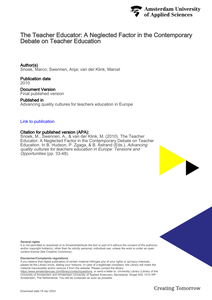Recent studies have identified that the teacher is the most important factor influencing the quality of education. Following this line of reasoning, it is likely to assume that the teacher educator is the most important factor influencing the quality of teacher education. Although many research studies and policy documents attempt to identify the qualities of teachers, only a few publications address the quality of teacher educators. This paper examines the contemporaryEuropean policy debate on the quality and status of teacher educators. Two issues will be addressed. Firstly, to what extent is teacher educator regarded as a profession? Secondly, what actions and measures are proposed to maintain or increase the quality and status of the teacher educator profession? Based on literature on professions and professionalism, a framework has been developed to guide our examination of European policy documents on teacher education to identify to what extent these documents express notions of teacher educators as professionals.
MULTIFILE

Research-based teacher education can be understood in different ways: as a call to understand teacher education institutions as research institutions, as the ambition to educate student teachers to have an inquiring attitude, as the basing of teacher education curricula on the latest research, or as a combination of all three.In this chapter we reflect on a method of connecting research, curriculum development and practice in teacher education, presenting a case study of a conversational community of teacher educators and researchers. The aim of the conversational community was to understand the process of curriculum design in teacher education as an inspiring and practical combination of design research, self-study, collaborative action research and curriculum study by teacher educators. This process was supported by a conversational framework in which curriculum development was understood as an ongoing dialogue between vision, intentions, design and practice in the teacher education curriculum. Using the conversational framework in this single case study of a conversational community, we have tried to connect teacher education research, curriculum development and practice in a meaningful way.

In dit artikel wordt een onderscheid gemaakt tussen verschillende soorten professionaliseringsactiviteiten van docenten in het hoger onderwijs met betrekking tot onderwijsinnovatie. Onderzoeker Madeleine Hulsen van het iXperium is onderdeel van het consortium Teachers2Learn en heeft meegewerkt aan de recent verschenen publicatie. Het hoger onderwijs krijgt te maken met een veranderende vraag van studenten, het werkveld en de samenleving. Dit is van invloed op de rol en taken van docenten in het hoger onderwijs. Het is dan ook van belang dat docenten zich (blijven) professionaliseren om de onderwijsinnovaties die nodig zijn als gevolg van deze veranderingen bij te houden. Docenten kunnen op verschillende manieren ondersteund worden bij deze professionalisering. Teachers2Learn heeft diverse praktijkvoorbeelden in kaart gebracht van manieren waarop docenten in het hoger onderwijs werken aan hun professionalisering. Hierbij is gekeken naar in hoeverre er een verband is tussen de ondernomen professionaliseringsactiviteiten en onderwijsinnovatie. Het onderzoek heeft geleid tot een raamwerk waarin verschillende professionaliseringsinitiatieven worden gekenmerkt en van elkaar worden onderscheiden. Dit raamwerk kan helpen om te reflecteren op professionaliseringsactiviteiten en te bepalen waar multi- of interdisciplinaire samenwerking nodig is.
LINK
Advances in technology are opening up new learning opportunities, consequently having an impact on conventional teaching and learning concepts. The roles of teachers, students and universities are also being transformed worldwide. The Academy for Leisure & Events of BUas has always been part of the above quest.Therefore, it is crucial that teaching methods and learning experiences in higher education are dynamic and continuously incorporate innovative approaches as well as integrate new technologies. After all, it is essential to be prepared for the way students learn nowadays and for the future demand coming.It is now more important than ever, especially considering the challenging coronavirus times we are in, for Breda University of Applied Sciences – as a partner of this project – to actively contribute to strengthening staff capacities in innovative teaching and learning methods and digital skills. For instance by offering training courses in a blended model, combining face-to-face teacher training with MOOCs and e-learning.As designing meaningful experiences has always been at the heart of the mission and work ofthe Academy for Leisure & Events, this project builds upon further extension of networks in teaching and learning innovation in national and international higher education contexts.Partners:FH Joanneum University of Applied Sciences, Universidad Carlos III de Madrid, Universidad de Lima, Universidad Catolica San Pablo, Universidad de Piura, Universidad Austral de Chile, Universidad de Santiago de Chile, Universidad Vina del Mar